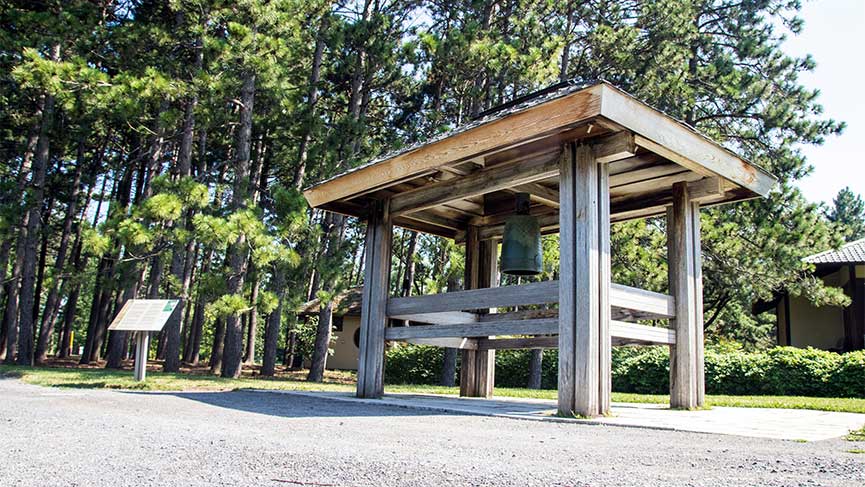Hiroshima and Montreal Twinning: Celebrating 25 years

Montreal
By Louise Royer
The city of Hiroshima, Japan, was the site of an atomic bomb explosion on August 6, 1945. Montreal still remembers, and since that day has remained committed to the cause of international nuclear disarmament. In fellowship with the worldwide organization Mayors for Peace and the citizens of Montreal themselves, who advocate for this cause through many various organizations, we maintain that memory alive.
The bell, a gift from the city of Hiroshima to Montreal’s Botanical Gardens, hangs in our city’s acclaimed Japanese gardens, commemorating the alliance of peace that binds our twin cities together. During a ceremony observed each year, this bell of peace is rung at 7:15 in the evening on August 5, the moment when the bomb was detonated over Hiroshima so many time zones away. Many artists, among them several artisans of peace, have provided moving and meaningful contributions to this ceremony. Although their visits were suspended during the pandemic, students from the city of Hiroshima were again in attendance at the 2023 commemoration, symbolizing the same commitment.
Hiroshima is far from alone. In 2017, twenty-five other cities had partnership with Montreal. This embrace of Montreal’s twinning with Hiroshima shows how deeply people desire peace and how fervent they are in their advocacy for nuclear disarmament. Given this context, states have a responsibility to act on this issue. Here in Canada, at least one federal MP was a member until recently of the group Parliamentarians for Nuclear Non-Proliferation and Disarmament.
The Treaty on the Prohibition of Nuclear Weapons (TPNW) was signed and ratified by a majority of UN member nations in 2017. Torontonian and Hibakusha1 Setsuko Thurlow was a driving force advocating for the treaty. Nonetheless, emulating our powerful neighbour, Canada refused to ratify the document, claiming to place her trust in the non-proliferation treaty. The country’s national security was supposedly based on deterrence: the hope that our NATO allies would deploy nuclear arms in Canada’s defence.
Pope Francis, meanwhile, claims that the mere possession of nuclear arms is immoral (Address of His Holiness Pope Francis to Members of the Diplomatic Corps, January 9, 2023). Having explained his position during a visit to Hiroshima on November 24, 2019, the Holy Father reiterated his position in the text of his encyclical letter, wherein he discusses the fellowship of mankind, Fratelli tutti, 262. Here Pope Francis clarifies, “In this context, the ultimate goal of the total elimination of nuclear weapons becomes both a challenge and a moral and humanitarian imperative…”
Then on May 11 of this year, at the 60th anniversary of St. John XXIII’s encyclical Pacem in Terris, Pope Francis stated, “It necessitates a profound reform of the multilateral structures the States have created to manage security and guarantee peace, but which are now deprived of the freedom and possibility of action. It is not enough for them to proclaim peace if they are not endowed with the autonomous capacity to promote and implement concrete actions, since they risk not being at the service of the common good, but merely partisan instruments.”
Every year at the beginning of the month of August, the Catholic Church in Japan prays for nuclear disarmament and peace. From August 6 to 15, during the pilgrimage of Marie-Reine-de-la-Paix, and again on August 26, the streets of Montreal will welcome citizens as they walk, praying for peace and an end to war.
These are wonderful opportunities to express our thanksgiving for 25 years of the twinning that has united Hiroshima and our city of Montreal. We will again be giving thanks for the guidance of the Holy Spirit, who teaches us to work together as artisans for peace!
Following are some relevant resources:
- Brochure: Nuclear Weapons… An Enduring Peril!
https://echecalaguerre.org/wp-content/uploads/2021/05/nucleaire-eng-pages_FINAL.pdf Échec à la guerre, 2021 (translated from the French)
- Film: The Vow from Hiroshima: https://www.thevowfromhiroshima.com/
- Message of the Holy Father Francis on the 60th anniversary of Pacem in Terris:
https://www.vatican.va/content/francesco/fr/messages/pont-messages/2023/documents/20230511-messaggio-annivpacem.html
- Life and works of Takashi Nagai, declared “Servant of God” by the Catholic Church:
https://www.la-croix.com/Definitions/Figures-spirituelles/Nagai-Takashi-irradie-bombe-saint-Nagasaki-2022-08-10-1701228393
- Declaration of the Plenary Assembly of the Catholic Bishops of Canada (2019):
https://www.cccb.ca/justice-and-peace/peace-and-security/
1 Hibakusha: Survivor of the atomic bomb

Comment
Comment
Add new comment